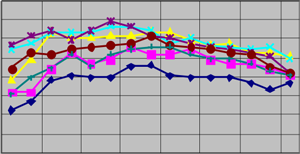Estimation of late reverberation spectrum: optimization of parameters
DOI:
https://doi.org/10.3103/S0735272715070043Keywords:
late reverberation suppression, late reverberation spectrum, automatic speech recognition, speech signal quality, Acc%, PESQ, BSD, SRR, LSDAbstract
Correction of speech signals distorted by reverberation is topical in building communications systems, automatic speech recognition systems, and hearing aids. The late reverberation suppression by the spectral subtraction method or the frequency correction method involves the need of estimating the late reverberation spectrum. Though the procedure of such estimation is generally developed, a number of uncertain items related to its optimization still exist. Recommendations elaborated in this study make it possible to optimize the estimation of late reverberation spectrum in terms of such criteria as the speech signal quality and the accuracy of automatic speech recognition by using computer simulation methods.References
- COHEN, ISRAEL; HUANG, YITENG; CHEN, JINGDONG; BENESTY, JACOB. Noise Reduction in Speech Processing. Berlin, Heidelberg: Springer-Verlag, 2009, DOI: http://dx.doi.org/10.1007/978-3-642-00296-0.
- NAYLOR, PATRIK A.; GAUBITCH, NIKOLAY D. (eds.), Speech Dereverberation. London: Springer, 2010, ISBN-10: 1849960550.
- EPHRAIM, Y.; MALAH, D. Speech enhancement using a minimum mean square-square error log-spectral amplitude estimator. IEEE Trans. Acoust., Speech, Signal Process., Apr. 1985, v.33, n.2, p.443-445, DOI: http://dx.doi.org/10.1109/TASSP.1985.1164550.
- YOSHIOKA, T.; SEHR, A.; DELCROIX, M.; KINOSHITA, K.; MAAS, R.; NAKATANI, T.; KELLERMANN, W. Making machines understand us in reverberant rooms: robustness against reverberation for automatic speech recognition. IEEE SP Magazine (Signal Processing), Nov. 2012, v.29, n.6, p.114-126, DOI: http://dx.doi.org/10.1109/MSP.2012.2205029.
- LEBART, K.; BOUCHER, J.M.; DENBIGH, P.N. A new method based on spectral subtraction for speech dereverberation. Acta Acust. United Ac., 2001, v.87, n.3, p.359-366, http://www.ingentaconnect.com/content/dav/aaua/2001/00000087/00000003/art00008.
- HABETS, EMANUEL. Single- and multi-microphone speech dereverberation using spectral enhancement. Dissert. … Doctor of Philosophy Electrical Engineering. Technische Universiteit Eindhoven, 2007, 241 p.
- PRODEUS, A.; LADOSHKO, O. On existence of optimal boundary value between early reflections and late reverberation. Proc. of IEEE 34th Int. Sci. Conf. on Electronics and Nanotechnology, ELNANO, 15-18 April 2014, Kyiv, Ukraine. IEEE, 2014, p.442-446, DOI: http://dx.doi.org/10.1109/ELNANO.2014.6873443.
- BROOKS, M. VOICEBOX: Speech Processing Toolbox for MATLAB. Imperial College London, Electrical Engineering Department, http://www.ee.ic.ac.uk/hp/staff/dmb/voicebox/voicebox.html.
- YOUNG, S.; EVERMANN, G.; GALES, M.; ET AL. The HTK Book. Cambridge: University Engineering Department, 2009, 375 p.
- LOIZOU, P. Speech Enhancement: Theory and Practice. Boca Raton: CRC Press, 2007, 648 p.
- BEERENDS, JOHN G.; LARSEN, ERIK; IYER, NANDINI; VAN VUGT, JEROEN M. Measurement of speech intelligibility based on the PESQ approach. Proc. of Int. Conf. on Measurement of Speech and Audio Quality in Networks, MESAQIN, 2 June 2004, Prague, Czech Republic. Prague, 2004.

Downloads
Published
2015-07-15
Issue
Section
Research Articles

